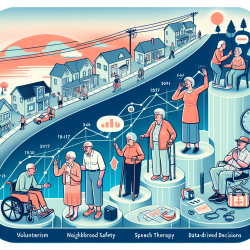Introduction
In the wake of the COVID-19 pandemic, the mental health of adolescents has become a pressing concern. The recent study titled "Income inequality and mental health in adolescents during COVID-19, results from COMPASS 2018–2021" sheds light on the exacerbating effects of income inequality on adolescent mental health. As practitioners, understanding these findings can guide us in developing more effective interventions and policies.
Key Findings
The study analyzed data from 29,722 students across four Canadian provinces, focusing on the period from 2018 to 2021. The findings revealed that:
- Adolescents in areas with higher income inequality reported increased anxiety symptoms during the pandemic compared to those in areas with lower inequality.
- Depressive symptoms also increased post-COVID, but the association with income inequality was less pronounced.
- The onset of COVID-19 highlighted the vulnerability of adolescents in socioeconomically disadvantaged areas.
Implications for Practitioners
These findings underscore the importance of addressing income inequality in mental health interventions. Practitioners can enhance their skills by:
- Incorporating socio-economic factors into assessments and treatment plans.
- Advocating for policies that address income disparities and support mental health resources in schools.
- Engaging in further research to explore long-term effects and potential interventions.
Encouraging Further Research
The study suggests that future research should employ quasi-experimental methods to strengthen the findings. Practitioners are encouraged to collaborate with researchers to explore innovative solutions that address the root causes of mental health disparities.
Conclusion
The link between income inequality and adolescent mental health is a critical area of focus, especially in the context of pandemic recovery. By integrating these insights into practice, we can better support the mental well-being of adolescents and advocate for systemic changes that promote equity.
To read the original research paper, please follow this link: Income inequality and mental health in adolescents during COVID-19, results from COMPASS 2018–2021.










